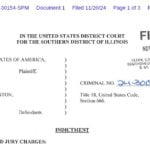EDGAR CO (ECWd) –
At a time when finances are scarce, and obtaining financing is even more difficult, it appears people and government bodies will do anything to “qualify” for loans and grants.
Indicators
The Ohio Auditor of State published a study on indicators your local government is in finacial trouble. Below are some of those indicators.
– recurring financial probelms IE: deficits in conseutive years
– short term borrowing in consecutive years
– borrowing against future revenues
– and borrowing to cover cash flow needs
A recent study from The Civic Federation stated: “An increasing trend in short-term debt is considered by some experts to be the best single warning indicator of coming financial problems“.
Clark Edgar Rural Water District ( CERWD ) current situation as reported in their meeting minutes:
The Clark-Edgar Rural Water District has, for over a year and a half, been paying their monthly invoices and bills through a line of credit at the First Fianncial Bank. Some are as little as $25k and some months they are over $200k. First Financial Bank has given CERWD a line of credit of $2.75 million. Its balance as of December of 2011 was over $1.5 Million million with no end in sight without bond sales. We are awaiting a FOIA request to determine the current balance as we know more debt was added from the minutes.
We haven’t yet looked at the cost to the District taxpayers of this short term loan, but the average person can see that we are paying interest every month, and on invoices due out. That sounds a little like borrowing to cover cash flow needs to me.
“We”, and I purposely use that word to mean “We, the Clark-Edgar Rural Water District” (to include employees, trustees, customers, and non customers in the district) unlike what at least one of the Trustees thinks the “We” is. We, from all appearances, have been borrowing against future revenue for a long time. I’m confident that starting projects without the grant money in-hand fall into that catagory. What appears to happen is the contractors work on projects to extend the service area and the District pays the invoices through the line of credit hoping a grant check will arrive in time to buy us, the District, a few more months, then we start the cycle all over again. This position is based on the fact the audit states:
“The District has a line of credit loan for $2,750,000.00 with First Financial Bank of Marshall, Illinois, to help finance the cost of several water line extensions in various townships.”
The District, in April 2012, showed a little more than $7,300 in the general fund, and talked about selling bonds and the need to “show more income”. According to their meeting minutes, they chose the approach of transfering money from, or reducing the deposits to, other accounts into the general fund for the purpose of showing more income to qualify for more bond sales. At the first meeting we attended in July 2012, there was an obvious concern of the speed in which bonds could be sold. The stated purpose for the bond sales was to restructure the outstanding debt (for the most part). We later discovered there are over $1, 200,000.00 million in debt payments due in 2012 with a total debt liability of the district, according to the audit, of $22,000,000.00 million!
We know the District is authorized to sell bonds, most of which are subject to back door referendum. The bond amounts currently being discussed range between $5 million and $8 million dollars. According to the information provided to the ECWD’s those proposed bonds are INTEREST ONLY for the first 18 years and will cost as much as $10 million to $15.7 Million Dollars through the life of the bond.
While none of this may be collected using property taxes, the customers are responsible for repayment through higher water usage rates. Should the District become unable to make the payments, the bonding agents will step in to raise the rates and other fees to a level needed for repayment. <span style="font-family: Courier New; font-size: small;">(70 ILCS 3705/22)</span> <span style="font-family: Courier New; font-size: small;">(from Ch. 111 2/3, par. 209)</span>
“Debt, n. An ingenious substitute for the chain and whip of the slavedriver. ~Ambrose Bierce, The Devil’s Dictionary, 1911”







No Comments
Sorry, the comment form is closed at this time.